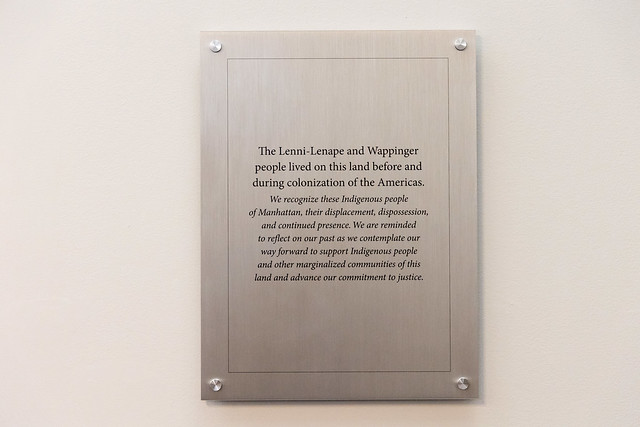Columbia Law Installs Land Acknowledgment Statement on Campus
The plaque, unveiled on October 9, memorializes the Indigenous history of Columbia’s campus and the Law School’s ongoing commitment to justice.
Lecturer in Law Precious D. Benally ’13, Dean Gillian Lester, and Eldred Lesansee ’25 at the plaque unveiling.
When Eldred Lesansee ’25 arrived at Columbia Law, he was eager to join the Law School community and connect with fellow Native American law students. One year later, as president of both Columbia Law’s Native American Law Students Association (NALSA) and the National Native American Law Students Association, Lesansee has helped to start a schoolwide conversation about the history and presence of Native people in the community and to ensure that future Native students feel welcomed from the moment they step foot on campus.
In collaboration with students, faculty, staff, and alumni, Columbia Law unveiled a plaque in the lobby of Jerome L. Greene Hall on October 9, memorializing the Indigenous history of Columbia’s campus and affirming the Law School’s ongoing commitment to recognize and support Indigenous people within and around the Columbia community.
The land acknowledgment reads:
The Lenni-Lenape and Wappinger people lived on this land before and during colonization of the Americas. We recognize these Indigenous people of Manhattan, their displacement, dispossession, and continued presence. We are reminded to reflect on our past as we contemplate our way forward to support Indigenous people and other marginalized communities of this land and advance our commitment to justice.
“Although we know that we won’t be able to initially quantify the impact of this plaque, I do know for sure that this will be a more welcoming place for all Indigenous people—and Indigenous students, especially—for the years to come,” said Lesansee, a tribal member of the Pueblos of Jemez and Zuni in New Mexico and Arizona.
The land acknowledgment was developed with input from community members across the Law School and the university, including NALSA, the Office of Student Services, the Office of the Dean, and the Office of University Life. Modeled after the language used in a plaque on Columbia’s Morningside campus, it serves as a starting point for learning about Columbia’s history and the Law School’s commitment to creating an inclusive environment for its students. The Law School’s land acknowledgment also incorporates language that speaks specifically to justice “because we are a law school, and what we do is we think about justice,” said Gillian Lester, Dean and Lucy G. Moses Professor of Law.
The plaque is “a physical reminder so that all who cross the threshold of the Law School are undertaking the kind of rigorous and honest self-examination that enables our continued growth and improvement for the benefit of the community in the long run,” said Dean Lester. “We see these words, we see this language, and we re-embrace our commitments.”
“Columbia Law School’s land acknowledgment honors the Lenape people—past and present—and recognizes the history that brought us—the Law School community—to where we are today. By memorializing this formal acknowledgment in the heart of the Law School, Columbia is making an important step in embracing its vision to shape a more just, well-governed, and prosperous future,” said Precious D. Benally ’13, a lecturer at Columbia Law and a citizen of the Diné Nation from Northern New Mexico. “As an alumna of this school, I would like for part of that future to include the inclusion of tribal history and the incorporation of contemporary Indigenous thoughts and actions into Columbia’s legal education.”
Benally, who served as president of the National Native American Law Students Association as a student at Columbia Law, noted that the Law School currently supports a number of Indigenous-centered programs and academic ventures, including NALSA and NALSA Moot Court teams. “These programs, along with the formal land acknowledgment, highlight Columbia Law’s commitment to fostering an environment of success and possibility for its students and serves as the foundation for expanding its Indigenous legal education, scholarship, and community partnerships,” she said.
